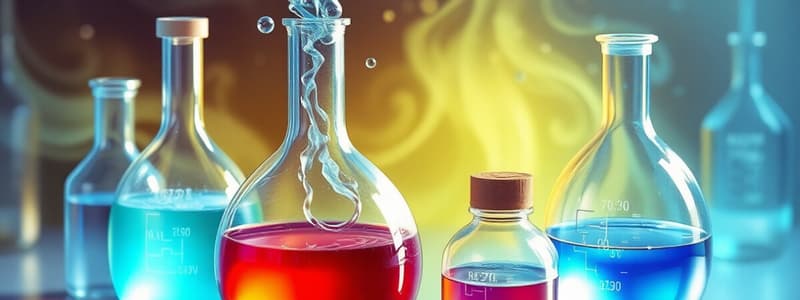Podcast
Questions and Answers
What is the Maillard reaction primarily responsible for in cooking?
What is the Maillard reaction primarily responsible for in cooking?
- Altering the color of vegetables
- Enhancing flavors through browning (correct)
- Increasing moisture content
- Preserving food items
Which chemical mechanism do bleaches employ to whiten fabrics?
Which chemical mechanism do bleaches employ to whiten fabrics?
- Oxidation (correct)
- Reduction
- Neutralization
- Saponification
What role do surfactants play in cleaning agents?
What role do surfactants play in cleaning agents?
- Emulsify oils and dirt (correct)
- Increase the viscosity of liquids
- Lower the pH of substances
- Remove water from surfaces
What is a primary benefit of using fertilizers in agriculture?
What is a primary benefit of using fertilizers in agriculture?
What is the result of combustion reactions?
What is the result of combustion reactions?
Which statement best describes the function of humectants in skin care products?
Which statement best describes the function of humectants in skin care products?
What distinguishes biodegradable materials from non-biodegradable ones?
What distinguishes biodegradable materials from non-biodegradable ones?
Which of the following is an important concept in the field of pharmaceutical chemistry?
Which of the following is an important concept in the field of pharmaceutical chemistry?
Flashcards are hidden until you start studying
Study Notes
Importance of Chemistry in Daily Life
-
Food Chemistry
- Understanding preservatives, flavorings, and colorings.
- Nutrient composition (carbohydrates, proteins, fats).
- Cooking reactions (Maillard reaction, caramelization).
-
Cleaning Agents
- Role of acids and bases in household cleaners.
- Detergents and surfactants: how they remove dirt and grease.
- Bleaches and disinfectants: chemical mechanisms of action.
-
Medicines and Health
- Pharmaceutical chemistry: drug design and development.
- Vaccines and their biochemical basis.
- Chemical reactions in the body (metabolism).
-
Cosmetics and Personal Care
- Chemistry of skin care products (emollients, humectants).
- Ingredients in makeup and their functions (pigments, preservatives).
- Sunscreens and UV protection mechanisms.
-
Environmental Chemistry
- Impact of chemicals on air and water quality.
- Biodegradable materials vs. non-biodegradable waste.
- Role of chemistry in pollution control and remediation.
-
Household Chemistry
- pH levels in common substances (vinegar, baking soda).
- Reactions in cooking (baking powder, fermentation).
- Chemical storage and safety (labeling, proper disposal).
-
Agricultural Chemistry
- Use of fertilizers and pesticides: benefits and risks.
- Soil chemistry and nutrient cycling.
- Impact of genetically modified organisms (GMOs).
-
Materials Chemistry
- Properties of different materials (metals, polymers, ceramics).
- Chemistry of everyday objects (plastics, glass).
- Advances in sustainable materials.
Daily Chemical Reactions
-
Combustion
- Reaction of carbon-containing substances with oxygen.
- Produces energy, carbon dioxide, and water.
-
Fermentation
- Conversion of sugars into alcohol or acids by microorganisms.
- Used in food production (bread, yogurt).
-
Oxidation and Reduction
- Processes involving electron transfer.
- Important in rusting, batteries, and respiration.
Conclusion
- Chemistry profoundly influences daily life through various products and processes.
- Understanding these interactions enhances awareness of health, safety, and environmental impacts.
Importance of Chemistry in Daily Life
- Chemistry plays a critical role in everyday life, influencing various products and processes.
- The study of chemistry helps understand the composition and properties of substances, as well as how they interact.
- This knowledge enables us to make informed decisions about health, safety, and environmental impact.
Food Chemistry
- Preservatives, flavorings, and colorings are used in food to extend shelf life, enhance taste, and improve appearance.
- Nutrients in food, such as carbohydrates, proteins, and fats, provide energy and building blocks for the body.
- Cooking reactions, such as the Maillard reaction (browning of meat) and caramelization (sugar browning), involve chemical changes that alter the flavor and texture of food.
Cleaning Agents
- Acids and bases are essential components of household cleaners, with acids removing mineral deposits and bases dissolving grease.
- Detergents and surfactants work by lowering the surface tension of water, allowing it to break down dirt and grease more effectively.
- Bleaches and disinfectants contain chemicals that kill bacteria and viruses by disrupting their cellular structures.
Medicines and Health
- Pharmaceutical chemistry focuses on the design and development of drugs that treat diseases by interacting with specific biological targets.
- Vaccines help prevent diseases by stimulating the immune system to produce antibodies against specific pathogens.
- Chemical reactions in the body, known as metabolism, involve the breakdown of nutrients to provide energy and the synthesis of essential molecules.
Cosmetics and Personal Care
- Skin care products contain emollients to soften the skin, humectants to retain moisture, and other ingredients to address various skin concerns.
- Makeup contains pigments to provide color, preservatives to prevent spoilage, and other ingredients that enhance the appearance and texture of the product.
- Sunscreens protect the skin from harmful ultraviolet (UV) radiation by absorbing or reflecting it.
Environmental Chemistry
- Chemicals released into the environment can impact air and water quality, potentially causing harm to living organisms.
- Biodegradable materials decompose naturally, while non-biodegradable waste can persist in the environment for long periods.
- Chemistry plays a vital role in pollution control and remediation efforts, helping to develop sustainable solutions for environmental issues.
Household Chemistry
- Common household substances, such as vinegar and baking soda, have distinct pH levels, influencing their cleaning properties.
- Baking powder contains chemicals that release gases during baking, contributing to the rise of cakes and bread.
- Proper chemical storage and disposal are essential for safety, preventing accidental poisoning or environmental contamination.
Agricultural Chemistry
- Fertilizers and pesticides are used to enhance crop yields but can have negative environmental impacts if applied improperly.
- Soil chemistry influences nutrient availability to plants, affecting their growth and yield.
- Genetically modified organisms (GMOs) have altered genomes, potentially enhancing crop traits but raising ethical and environmental concerns.
Materials Chemistry
- Different materials, such as metals, polymers (plastics), and ceramics, possess unique physical and chemical properties.
- Chemistry is involved in the production and properties of everyday objects, from plastics to glass, influencing their durability and sustainability.
- Advances in materials chemistry aim to develop new materials with improved properties, such as strength, lightness, and biocompatibility.
Daily Chemical Reactions
- Combustion is a chemical reaction involving the rapid reaction between a fuel and an oxidant, typically oxygen, releasing energy in the form of heat and light.
- Fermentation is a process used in food production, converting sugars into alcohol or acids by microorganisms.
- Oxidation-reduction reactions involve the transfer of electrons between molecules, playing essential roles in processes such as rusting, batteries, and respiration.
Studying That Suits You
Use AI to generate personalized quizzes and flashcards to suit your learning preferences.




